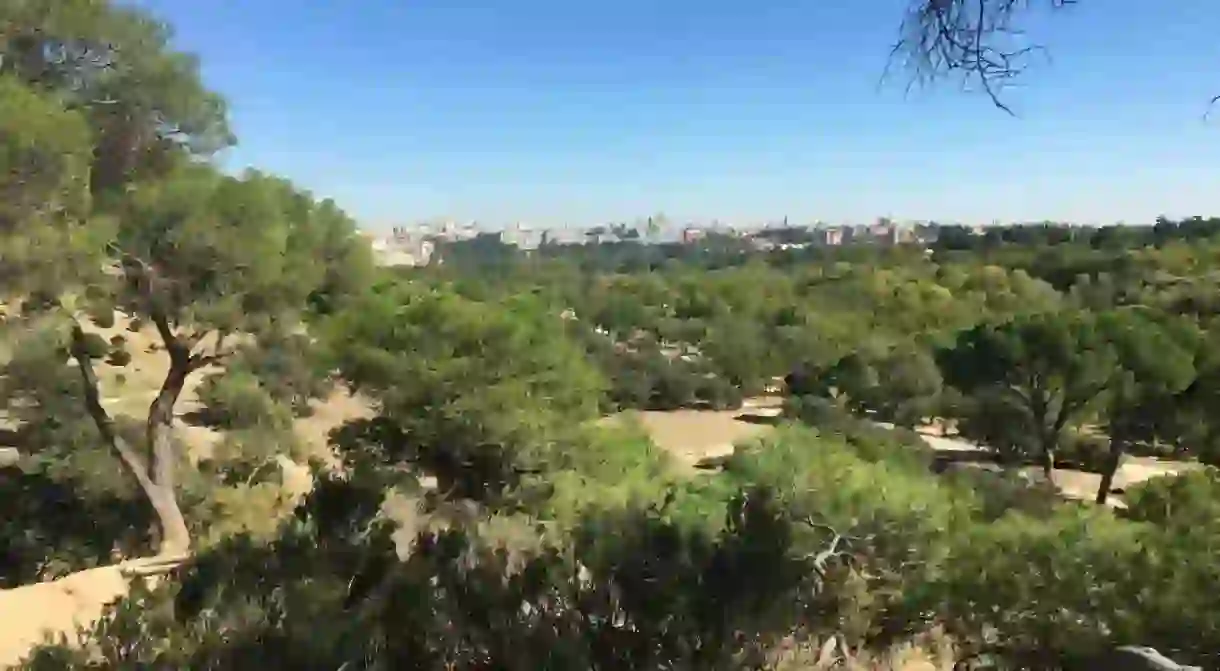A Guide to Visiting Madrid's Casa de Campo Park

Casa De Campo is Madrid’s biggest park and is a great place to visit, whether you fancy a relaxed picnic, a day riding the rollercoasters at the amusement park or perhaps a visit to the zoo.
History of Casa de Campo
Madrid’s largest park began life as a royal hunting ground under Philip II, who built the city’s royal palace when he moved Spain’s capital from Valladolid to Madrid. The king used the land for hunting, which gave rise to the name of the area. A country house had been built on the land in 1519, giving rise to the area’s name – Casa de Campo means ‘country house’ in Spanish.
The park was exclusively used by the Spanish royal family until the proclamation of Spain’s Second Republic in 1931, when the state donated the Casa de Campo to the people of Madrid. It has been a public park ever since.
During the Spanish Civil War, Madrid was under siege from Francoist forces for two and a half years. The front lines stretched through the Casa de Campo. Today, visitors can still see remnants of the war, such as bunkers, in the park.
Getting There
Walking
It’s easy to walk to the Casa de Campo from the centre of the city by heading down towards the River Manzanares. The area around the river, Madrid Rio, has been renovated recently and is a popular place to stroll, as well as having several play parks for children. Cross the river close to the Principe Pio metro station and you will be at the entrance to the Casa de Campo.

Cable Car
A cable car takes visitors from the Parque del Oeste, close to Madrid’s Egyptian temple (Temple of Debod) to a high point in the centre of the Casa de Campo. You can take a return trip (€5.90) or travel one way (€4.20) and walk back through the park.

Metro
Take line 10 of Madrid’s metro to Lago to reach the park’s lake and continue on to Batan or Casa de Campo if you are heading to the theme park or the zoo.
Activities
Boating Lake
Rent a boat on the picturesque boating lake, which has a backdrop of the distant Royal Palace and Almudena Cathedral across the River Manzanares.

Madrid Zoo Aquarium
Madrid’s zoo has over 6,000 animals from across the globe and is one of the few zoos in the world to house giant pandas. Panda parents Bing Xing and Hua Zui had twin cubs, Po and De De, in 2010. The zoo is also home to gorillas, giraffes, koala bears, bottlenose dolphins, leopards and giraffes.

Madrid Amusement Park
Madrid’s amusement park is an option for rollercoaster fans or families who need to entertain the kids for a few hours. It is home to a mixture of rides for younger children and bigger rollercoasters ideal for adrenaline junkies (try the Abismo, with its nosedives and loops, if you dare).
Outdoor Pools
During the summer months, the Casa de Campo’s Municipal Sports Centre opens its two outdoor pools. They are incredible popular, especially at weekends, when seemingly half of Madrid flocks to sunbathe and cool down in the pools’ refreshing waters.

Walking
One of the most enjoyable things to do in the Casa de Campo is just to walk around the huge park (it is over 17.5 square kilometres, or 1,750 hectares) and explore. It’ll make you feel as if you’ve stepped out of Madrid into the open countryside, until you spot an incredible view of the city from one of the park’s miradores, or viewpoints.

Sports
From jogging and mountain biking to kayaking on the park’s lake, the Casa de Campo is one of the best places in Madrid to do some sport.
Food
Casa de Campo’s lake is surrounded by wooden restaurants offering typical Spanish dishes and tapas. It’s a lovely spot for lunch or a cool beer after a hike through the park. Alternatively, you can take a picnic. There are lots of picnic benches dotted around the park, and it’s a popular spot for families to take a picnic at weekends.














